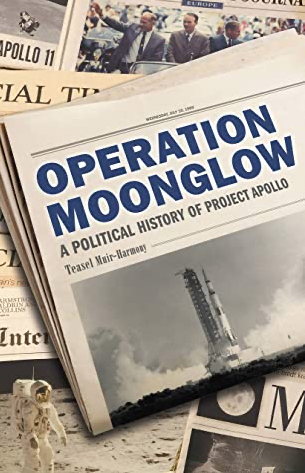
Operation Moonglow: A Political History of Project Apollo by Teasel Muir-Harmony
My rating: 4 of 5 stars
Operation Moonglow presents a unique angle on the space race. It is particularly well-conceived and meticulously researched. Muir-Harmony explores the psychological geopolitical strategy behind the US pursuit of scientific accomplishment in space presented as global collaboration and utilised as a diplomatic tactic. By carefully constructing and staging a global messaging that implied accomplishment by the US (as the dominant superpower) but was made explicit for the good of all humanity the US attempted to distract from domestic and international areas of contention.
Muir-Harmony substantiates her hypotheses with extensive and original research. It is well-marshalled and delivered alongside comprehensive contextualisation that backgrounds the historical narrative and provides a series of nuggets that reward careful reading.
What is consummately a work of research and an academically-leaning work is eminently readable and a significant contribution to scholarship on the space race. From the standpoint of the story arc, there is a real challenge in focusing on Operation Moonglow, the specific diplomatic sojourn by Nixon following the successful moon landing, which is chronologically situated about 75% of the way through the narrative. The bulk of the work is a buildup, and by that stage, the reader is probably thoroughly convinced by the author’s hypothesis. As a result, the main event itself comes as a bit of denouement. The actual itinerary and colour of specific events read in a very different fashion from the rest of the work. The same holds with the Giant Leap PR journey of the astronauts. Could the author have used a colourful recounting of the astronaut’s journey at the beginning of the book to foreshadow subsequent scholarly argument delivery? Possibly but that would be editorial decisions and may not be what works for everyone.
All in all, Operation Moonglow is a fascinating read – enjoyable, engaging, and substantive – a great nugget of learning.
